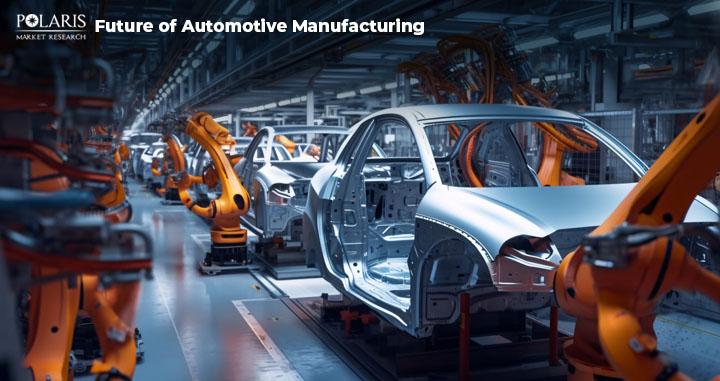How Technological Advancements Are Reshaping the Future of Automotive Manufacturing?
The automotive industry has undergone significant transformation over the past few decades. From electric vehicles to autonomous driving, automotive manufacturers have introduced several new features and technologies that have completely transformed the way we perceive automobiles and transportation in general. But have you ever wondered what automobiles will look like in the years to come? And how are technological advances fueling the transformative shift in the automobile industry?
In this blog post, we’ll delve deep into the world of automotive manufacturing, shedding light on the various steps involved in giving a vehicle its final form. Also, we’ll explore the latest trends that are transforming the world of automobiles. Continue reading!

What Is Automotive Manufacturing?
Automobile manufacturing refers to the process of assembling different parts and components to build automobiles, such as cars, electric trucks, and other motor vehicles. The process of automotive manufacturing is complex and involves several stages, ranging from designing the automobile to its testing and final delivery to customers. Manufacturing automobiles needs a variety of raw materials and specialized tools and equipment. Besides, skilled professionals are needed to assemble the parts and give the automobile its final form.
The automotive manufacturing process has come a long way since its early days in the 19th century. Today, automotive manufacturers use complex techniques and methods to complex the production process swiftly and easily. Also, new technologies are being incorporated into manufacturing processes to improve productivity and efficiency.
Automotive Manufacturing Process Workflow
The automotive manufacturing industry is a highly lucrative sector that produces millions of motor vehicles each year. However, the manufacturing of automotive products is highly complex and involves multiple steps. These include:
Designing: Designing is the first step in the manufacturing process of automotive products. It involves the development of plans, specifications, and bills of materials for the automobile that will be manufactured. Depending on the project’s complexity, the design stage can last for months or even years. However, it’s highly crucial as it determines customer loyalty and the manufacturer’s cash flow.
Building: The designing stage is followed by the building phase in automobile manufacturing. Here, assembly lines and processes are used for assembling the parts and equipment of the automobiles. Automobile manufacturers use robots for tasks such as welding and painting. The building stage may take weeks or months to complete.
Quality Check: After the building stage, the automobile goes through a number of safety and quality tests before being sent to dealers or customers. The main aim of these tests is to ensure the automobile meets all the required performance and safety standards. Only after passing the safety tests and quality checks can the vehicle be sold to customers.
Shipping: This is the final stage of the automobile manufacturing process. Here, logistics and transportation are used to ship the vehicles to dealerships. Based on the traveling distance and various other factors, the shipping stage can take days to weeks to complete.
Top Trends in Automotive Manufacturing
Below, we’ve listed some of the top trends in automotive manufacturing:
Increasing Role of Software
Automotive operating systems and software are critical components of modern automobiles. It determines several aspects of the automobile’s operations, performance, and features, such as infotainment, safety features, and drive-assistance features. Advances in interoperable data and the centralization of engineering and design data on cloud-connected platform software help take away the barriers associated with incompatible files or data between different departments.
Electrification of Automobiles
Vehicle electrification is a major trend that has gained significant traction in the past decade and is still on the increase. More automakers are investing in the development of electric vehicles to cater to the rising demand for environmentally friendly mobility solutions and comply with government laws and regulations. In the upcoming years, it’s anticipated that more drivers will adopt electric vehicles as battery efficiency and EV charging infrastructure continue to improve.
Growing Focus on Sustainability
There are several ways in which the automotive sector is working towards meeting sustainability goals. Automobile manufacturers are increasingly emphasizing the use of sustainable materials such as lighter-weight composites to improve fuel efficiency and design lighter-weight components. Also, they are using durable coatings to reduce wear and extend the vehicle lifespan. Other material trends in the automotive sector include recycled steel, plant-based leather, reclaimed wood, and antimicrobial materials that lower the need to use potentially polluting cleansers.
Use of AI and Machine Learning
Various artificial intelligence (AI) technologies, such as generative AI and machine learning (ML), play a crucial role in the automotive sector. AI and ML facilitate the development of smart factories where automotive manufacturers can use IoT sensors to collect crucial data and information about the manufacturing processes. The information can then be analyzed and used to optimize several robotic processes, such as welding, painting, and assembly.
Who Are Top Automobile Manufacturers?
Volkswagen, Toyota Motor Corp. (TM), Stellantis, Mercedes Benz AG, Ford Motor Co. (F), General Motors, Tesla Motors, and Nissan Motors are some of the top automobile manufacturers. These manufacturers focus on research and development to enhance their production processes. Also, they are adopting several strategic initiatives to increase their market share. Some of the latest market developments are:
- In September 2024, SiliconAuto partnered with Siemens Digital Industries Software to adopt Siemens AVE360™ software. The adoption of the software will help SiliconAuto speed up the development of its ADAS SoC solutions and develop future-ready vehicles that meet the highest standards of safety and performance.
- In September 2024, Park+ announced the launch of Park+ Research Labs, a data-driven service. The introduction of the new service is set to empower automobile ecosystem stakeholders to identify actionable insights and unlock business value.
Conclusion
The automotive industry has always been at the forefront of adopting new technologies to enhance productivity and efficiency, enhance passenger safety, and offer great driving experiences. The convergence of autonomous driving, electric vehicles, and sustainability is paving the way for a future where automobiles aren’t just modes of transportation but integral parts of a sustainable ecosystem.


